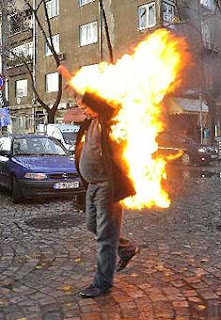Man sets himself on fire in Bulgaria in opposition to daily 10-minute Turkish language broadcast
Thursday, November 12, 2009
I found this news here and was about to translate it into English but looks like the news can be read in English here so no need. Besides having studied the language a tiny bit I know little about Bulgaria, but this type of protest is something that one reads about here in Korea from time to time, such as this one where someone attempted to cut off his finger (others have done so successfully, by the way) in protest against a dispute with Japan over a tiny island.
As for the news broadcast itself: in most cases these 10 or so minute-long broadcasts that some countries in Europe have have largely become symbolic since internet use is so high. Lithuania recently decided to cancel a broadcast in Russian (not sure if they went through with it or not), but internet penetration in Lithuania is about 60%. In Bulgaria, however, it is still at 33% and one could make the argument that a TV broadcast is still an essential way to obtain the news for some.
My advice to countries or regions with languages with smaller populations than those next door that feel threatened by their presence is always the same: if the language is in a weak state (Cornish, Sardinian) then somewhat draconian measures may be in order to preserve it, but if a country's language seems to be doing fine (Lithuanian, Bulgarian), then maintaining a certain ability in the language next door may be advantageous in the long term. Korea for example placed a ban on Japanese shortly after independence and 60+ years later finding a Korean fluent in Japanese is very rare. Taiwan, on the other hand, did not do the same thing and as a result it is much easier to find a fluent speaker in Taipei than in Seoul.
And though not quite comparable, it is still interesting to note that Macau in China also maintains a level of proficiency and interest in Portuguese, which is advantageous for the region and the country as a whole.
As for the news broadcast itself: in most cases these 10 or so minute-long broadcasts that some countries in Europe have have largely become symbolic since internet use is so high. Lithuania recently decided to cancel a broadcast in Russian (not sure if they went through with it or not), but internet penetration in Lithuania is about 60%. In Bulgaria, however, it is still at 33% and one could make the argument that a TV broadcast is still an essential way to obtain the news for some.
My advice to countries or regions with languages with smaller populations than those next door that feel threatened by their presence is always the same: if the language is in a weak state (Cornish, Sardinian) then somewhat draconian measures may be in order to preserve it, but if a country's language seems to be doing fine (Lithuanian, Bulgarian), then maintaining a certain ability in the language next door may be advantageous in the long term. Korea for example placed a ban on Japanese shortly after independence and 60+ years later finding a Korean fluent in Japanese is very rare. Taiwan, on the other hand, did not do the same thing and as a result it is much easier to find a fluent speaker in Taipei than in Seoul.
And though not quite comparable, it is still interesting to note that Macau in China also maintains a level of proficiency and interest in Portuguese, which is advantageous for the region and the country as a whole.







0 comments:
Post a Comment